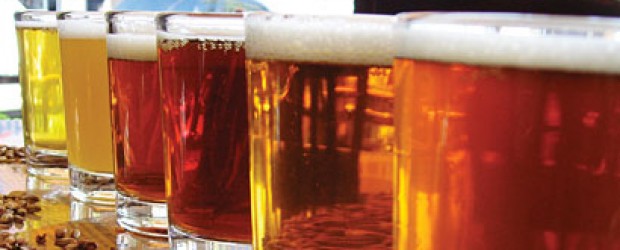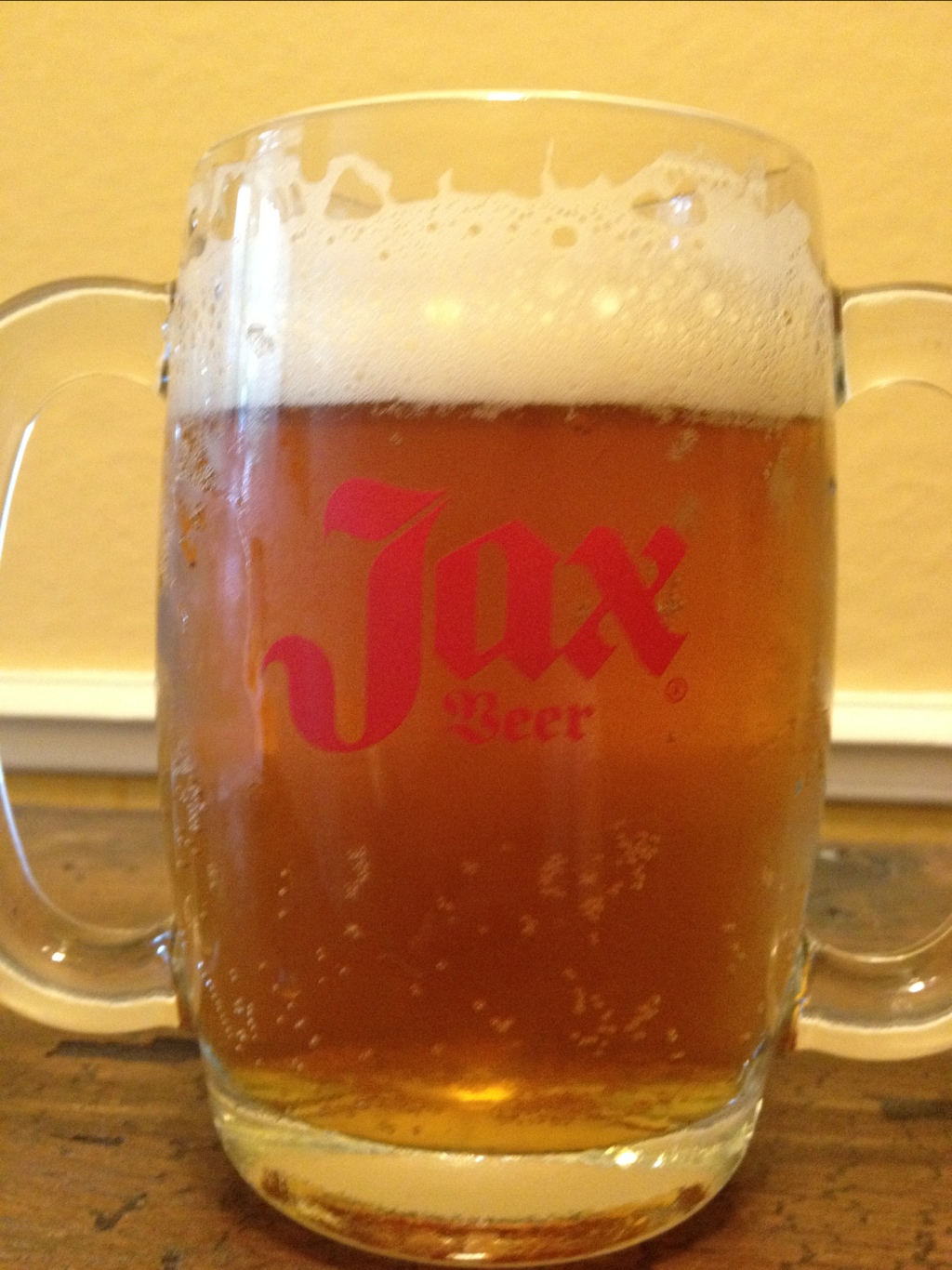This is an adaptation of the club IPA we brewed. Note that even though it says all 2-row below I actually had 14.25 pounds of 2-row and .75 pounds of pilsner. I had the extra pilsner with no place to put it so it went in. water modification was the same as project Nathan. Modify 6 gallons of water with 3/4 teaspoon gypsum. 1/3 teaspoon calcium chloride. Put 5 of that in the mash. I also acidified the mash with lactic acid 1.5 teaspoon.
How It Went:
Everything went fairly well. I needed to boil it a little longer before I started my hop cycle because I came up with a larger volume and a 1.060 wort. It’ll be fine though! I also forgot the whirlfloc. I pitched the yeast and it took off like a champ. Should be a pretty good beer. The fermentation is interesting because I’m doing it in an insulated side room of my house. It’s not temperature controlled but given the highs during the day are 74 degrees and the room stays below 70 right now I thought why not try it.
After about a week in the fermenter it’s slowing down some and the gravity is 1.017. The beer tastes great. Very herbal, orange like with nice fruit character. Added dry hops and will let it ferment down to 1.012ish or below. It should be a real crowd pleaser.
After 10 days it’s done at 1.012. Simcoe and Centennial are delicious together. The only ding on this beer might be clarity in competition but being that dry hopped beers “should” be allowed I would argue it’s very close to a perfect example of the style. We’ll see how the head retention fairs when carbonated.
Update December 15 2012: After 22 days this beer is perfect coming out of a bottle. It’s clarity is nice and the resiny character which was there at 14 days is gone. Amazing how much difference a week makes in a beer. I brought a few bottles to the beer club party a week ago and it was much more pronounced in it’s hoppiness. I will certainly brew this beer again as brewed. It should be noted that the crystal 2o wasn’t crystal 20. It was carahell which is a German 10L crystal by Weyermann
Recipe Details
| Batch Size | Boil Time | IBU | SRM | Est. OG | Est. FG | ABV |
|---|---|---|---|---|---|---|
| 6 gal | 60 min |
Style Details
| Name | Cat. | OG Range | FG Range | IBU | SRM | Carb | ABV |
|---|---|---|---|---|---|---|---|
| American IPA | 14 14B | 1.056 - 1.075 | 1.01 - 1.018 | 40 - 70 | 6 - 15 | 0 - 0 | 5.5 - 7.5 % |
Fermentables
| Name | Amount | % |
|---|---|---|
| Pale Malt (2 Row) US | 14.25 lbs | 89.06 |
| Caramel/Crystal Malt - 20L | 1 lbs | 6.25 |
| Pilsner (2 Row) Ger | 0.75 lbs | 4.69 |
Hops
| Name | Amount | Time | Use | Form | Alpha % |
|---|---|---|---|---|---|
| Centennial | 2 oz | 60 min | Boil | Pellet | 8 |
| Centennial | 1 oz | 1 min | Boil | Pellet | 10 |
| Centennial | 1 oz | 0 min | Dry Hop | Pellet | 10 |
| Simcoe | 1 oz | 20 min | Boil | Pellet | 13 |
| Simcoe | 1 oz | 0 min | Dry Hop | Pellet | 13 |
Yeast
| Name | Lab | Attenuation | Temperature |
|---|---|---|---|
| California Ale V (WLP051) | White Labs | 73% | 150.8°F - 158°F |
Notes
| Single infusion targeting 150F means 20 quarts at 161F. The final hops are for dry hopping for final 7 days. The yeast should be 05 not 04. Add irish moss in last 10. Modify 6 gallons of water with 3/4 teaspoon gypsum. 1/3 teaspoon calcium chloride. Put 5 of that in the mash. |
Download
| Download this recipe's BeerXML file |
The Original Plan:
Name: centennial simcoe ipa
Description: Single infusion at 153F. The final hops are for dry hopping for final 7 days. Add irish moss in last 10. Modify water with gypsum.
Post Boil Volume: 6.00
Pre Boil Volume: 7.00
Mash Time: 60.00
Boil Time: 60.00
Desired Original Gravity: 1.063
Desired Final Gravity: 1.01
Calculated Likely ABV% Based on Specified Gravities: 6.970
Users Targeted ABV%: 7.000
Desired CO2 Volumes: 2.5
Anticipated Brewhouse Efficiency: 68
Likely Original Gravity at 6.00 Based on Grains and Efficiency: @ 68% = 394 GU = 1.066
Grain: Pale Malt (2 Row) US qty:14.25
Grain: Pilsner (2 Row) Ger qty:0.75
Grain: Caramel/Crystal Malt – 20L qty:1.1
Hop : Centennial qty:2 at:60 mins. AA=10.00
Hop : Centennial qty:1 at:0 mins. AA=10.00
Hop : Centennial qty:1 at:0 mins. AA=10.00
Hop : Simcoe qty:0 at:0 mins. AA=13.00
Hop : Simcoe qty:1 at:20 mins. AA=13.00
Yeast: California Ale V qty:2 Max temp: 70.0 Min temp: 66.0
Style Name: American IPA (India Pale Ale(IPA))
centennial simcoe ipa Pocket Brewer XML Code»
<?xml version=”1.0″ encoding=”utf-16″?>
<RecipeClass>
<BREWER>Pocket Brewer</BREWER>
<Type>All Grain</Type>
<VERSION>1</VERSION>
<OriginalGravity>1.063</OriginalGravity>
<OriginalGravityImportExport>1.063</OriginalGravityImportExport>
<FinalGravityImportExport>1.01</FinalGravityImportExport>
<FinalGravity>1.01</FinalGravity>
<BatchSize>6</BatchSize>
<BatchSizeImportExport>6</BatchSizeImportExport>
<BoilVolumeSize>7</BoilVolumeSize>
<BoilVolumeSizeImportExport>7</BoilVolumeSizeImportExport>
<CO2Volumes>2.5</CO2Volumes>
<BoilTime>60</BoilTime>
<MashTime>60</MashTime>
<TargetABV>7</TargetABV>
<BrewHouseEfficiency>68</BrewHouseEfficiency>
<Name>centennial simcoe ipa</Name>
<Style />
<Description>Single infusion at 153F. The final hops are for dry hopping for final 7 days. Add irish moss in last 10. Modufy water with gypsum.</Description>
<StyleIdExact>14B</StyleIdExact>
<StyleIdGeneral>14</StyleIdGeneral>
<Yeasts>
<YeastAdditionClass>
<Quantity>2</Quantity>
<Name>California Ale V</Name>
<ProductID>WLP051</ProductID>
</YeastAdditionClass>
</Yeasts>
<Hops>
<HopAdditionClass>
<USE>Boil</USE>
<VERSION>1</VERSION>
<NOTES>Use for: General purpose bittering, aroma in American ales and Wheats</NOTES>
<QuantityIO>2</QuantityIO>
<Quantity>2</Quantity>
<QuantityText>2</QuantityText>
<Alpha>10.00</Alpha>
<AlphaText>10.00</AlphaText>
<TinsethIBUS>51</TinsethIBUS>
<IsWholeHop>false</IsWholeHop>
<TimeInMinutes>60</TimeInMinutes>
<TimeInMinutesText>60</TimeInMinutesText>
<Name>Centennial</Name>
<Visible>Visible</Visible>
</HopAdditionClass>
<HopAdditionClass>
<USE>Boil</USE>
<VERSION>1</VERSION>
<NOTES>Use for: General purpose bittering, aroma in American ales and Wheats</NOTES>
<QuantityIO>1</QuantityIO>
<Quantity>1</Quantity>
<QuantityText>1</QuantityText>
<Alpha>10.00</Alpha>
<AlphaText>10.00</AlphaText>
<TinsethIBUS>0</TinsethIBUS>
<IsWholeHop>false</IsWholeHop>
<TimeInMinutes>0</TimeInMinutes>
<TimeInMinutesText>0</TimeInMinutesText>
<Name>Centennial</Name>
<Visible>Visible</Visible>
</HopAdditionClass>
<HopAdditionClass>
<USE>Boil</USE>
<VERSION>1</VERSION>
<NOTES>Use for: General purpose bittering, aroma in American ales and Wheats</NOTES>
<QuantityIO>1</QuantityIO>
<Quantity>1</Quantity>
<QuantityText>1</QuantityText>
<Alpha>10.00</Alpha>
<AlphaText>10.00</AlphaText>
<TinsethIBUS>0</TinsethIBUS>
<IsWholeHop>false</IsWholeHop>
<TimeInMinutes>0</TimeInMinutes>
<TimeInMinutesText>0</TimeInMinutesText>
<Name>Centennial</Name>
<Visible>Visible</Visible>
</HopAdditionClass>
<HopAdditionClass>
<USE>Boil</USE>
<VERSION>1</VERSION>
<NOTES>High alpha bitterng hops with good aroma characteristics. Citrus aroma.</NOTES>
<QuantityIO>0</QuantityIO>
<Quantity>0</Quantity>
<QuantityText>0</QuantityText>
<Alpha>13.00</Alpha>
<AlphaText>13.00</AlphaText>
<TinsethIBUS>0</TinsethIBUS>
<IsWholeHop>false</IsWholeHop>
<TimeInMinutes>0</TimeInMinutes>
<TimeInMinutesText>0</TimeInMinutesText>
<Name>Simcoe</Name>
<Visible>Visible</Visible>
</HopAdditionClass>
<HopAdditionClass>
<USE>Boil</USE>
<VERSION>1</VERSION>
<NOTES>High alpha bitterng hops with good aroma characteristics. Citrus aroma.</NOTES>
<QuantityIO>1</QuantityIO>
<Quantity>1</Quantity>
<QuantityText>1</QuantityText>
<Alpha>13.00</Alpha>
<AlphaText>13.00</AlphaText>
<TinsethIBUS>20</TinsethIBUS>
<IsWholeHop>false</IsWholeHop>
<TimeInMinutes>20</TimeInMinutes>
<TimeInMinutesText>20</TimeInMinutesText>
<Name>Simcoe</Name>
<Visible>Visible</Visible>
</HopAdditionClass>
</Hops>
<Grains>
<GrainAdditionClass>
<QuantityIO>14.25</QuantityIO>
<VERSION>1</VERSION>
<YIELD>79.00</YIELD>
<COLOR>2.0</COLOR>
<ORIGIN>US</ORIGIN>
<SUPPLIER />
<NOTES>Base malt for all beer styles</NOTES>
<Quantity>14.25</Quantity>
<PotentialSpecificGravity>1.036</PotentialSpecificGravity>
<Type>Grain</Type>
<Name>Pale Malt (2 Row) US</Name>
</GrainAdditionClass>
<GrainAdditionClass>
<QuantityIO>0.75</QuantityIO>
<VERSION>1</VERSION>
<YIELD>81.00</YIELD>
<COLOR>2.0</COLOR>
<ORIGIN>Germany</ORIGIN>
<SUPPLIER />
<NOTES>German base for Pilsners and Bohemian Lagers</NOTES>
<Quantity>0.75</Quantity>
<PotentialSpecificGravity>1.037</PotentialSpecificGravity>
<Type>Grain</Type>
<Name>Pilsner (2 Row) Ger</Name>
</GrainAdditionClass>
<GrainAdditionClass>
<QuantityIO>1.1</QuantityIO>
<VERSION>1</VERSION>
<YIELD>75.00</YIELD>
<COLOR>20.0</COLOR>
<ORIGIN>US</ORIGIN>
<SUPPLIER />
<NOTES />
<Quantity>1.1</Quantity>
<PotentialSpecificGravity>1.035</PotentialSpecificGravity>
<Type>Grain</Type>
<Name>Caramel/Crystal Malt – 20L</Name>
</GrainAdditionClass>
</Grains>
<Adjuncts />
<MISCS />
<WATERS />
<MASH>
<MASH_STEPS />
<VERSION>0</VERSION>
<GRAIN_TEMP>0</GRAIN_TEMP>
<TUN_TEMP>0</TUN_TEMP>
<SPARGE_TEMP>0</SPARGE_TEMP>
<PH>0</PH>
<TUN_WEIGHT>0</TUN_WEIGHT>
<TUN_SPECIFIC_HEAT>0</TUN_SPECIFIC_HEAT>
</MASH>
<Id>f6ed1572-ebfc-4de5-a5ae-2cd3833eabf4</Id>
<BrewHouse>
<Efficiency>68</Efficiency>
</BrewHouse>
</RecipeClass>
<?xml version=”1.0″ encoding=”utf-16″?>
<RECIPE>
<NAME>centennial simcoe ipa</NAME>
<VERSION>1</VERSION>
<TYPE>All Grain</TYPE>
<NOTES>Single infusion at 153F. The final hops are for dry hopping for final 7 days. Add irish moss in last 10. Modufy water with gypsum.</NOTES>
<BREWER>Pocket Brewer</BREWER>
<BATCH_SIZE>22.7115</BATCH_SIZE>
<BOIL_TIME>60</BOIL_TIME>
<BOIL_SIZE>26.4968</BOIL_SIZE>
<EFFICIENCY>68</EFFICIENCY>
<FG>1.01</FG>
<OG>1.063</OG>
<CARBONATION>2.5</CARBONATION>
<HOPS>
<HOP>
<NAME>Centennial</NAME>
<VERSION>1</VERSION>
<ALPHA>10.00</ALPHA>
<AMOUNT>0.0567</AMOUNT>
<USE>Boil</USE>
<TIME>60</TIME>
<NOTES>Use for: General purpose bittering, aroma in American ales and Wheats</NOTES>
</HOP>
<HOP>
<NAME>Centennial</NAME>
<VERSION>1</VERSION>
<ALPHA>10.00</ALPHA>
<AMOUNT>0.0283</AMOUNT>
<USE>Boil</USE>
<TIME>0</TIME>
<NOTES>Use for: General purpose bittering, aroma in American ales and Wheats</NOTES>
</HOP>
<HOP>
<NAME>Centennial</NAME>
<VERSION>1</VERSION>
<ALPHA>10.00</ALPHA>
<AMOUNT>0.0283</AMOUNT>
<USE>Boil</USE>
<TIME>0</TIME>
<NOTES>Use for: General purpose bittering, aroma in American ales and Wheats</NOTES>
</HOP>
<HOP>
<NAME>Simcoe</NAME>
<VERSION>1</VERSION>
<ALPHA>13.00</ALPHA>
<AMOUNT>0</AMOUNT>
<USE>Boil</USE>
<TIME>0</TIME>
<NOTES>High alpha bitterng hops with good aroma characteristics. Citrus aroma.</NOTES>
</HOP>
<HOP>
<NAME>Simcoe</NAME>
<VERSION>1</VERSION>
<ALPHA>13.00</ALPHA>
<AMOUNT>0.0283</AMOUNT>
<USE>Boil</USE>
<TIME>20</TIME>
<NOTES>High alpha bitterng hops with good aroma characteristics. Citrus aroma.</NOTES>
</HOP>
</HOPS>
<FERMENTABLES>
<FERMENTABLE>
<NAME>Pale Malt (2 Row) US</NAME>
<VERSION>1</VERSION>
<AMOUNT>6.4637</AMOUNT>
<TYPE>Grain</TYPE>
<YIELD>79.00</YIELD>
<COLOR>2.0</COLOR>
<ORIGIN>US</ORIGIN>
<SUPPLIER />
<NOTES>Base malt for all beer styles</NOTES>
<COARSE_FINE_DIFF>1.50</COARSE_FINE_DIFF>
<MOISTURE>4.00</MOISTURE>
<DISASTATIC_POWER>140.0</DISASTATIC_POWER>
<PROTEIN>12.30</PROTEIN>
<MAX_IN_BATCH>100.00</MAX_IN_BATCH>
<POTENTIAL>1.036</POTENTIAL>
</FERMENTABLE>
<FERMENTABLE>
<NAME>Pilsner (2 Row) Ger</NAME>
<VERSION>1</VERSION>
<AMOUNT>0.3402</AMOUNT>
<TYPE>Grain</TYPE>
<YIELD>81.00</YIELD>
<COLOR>2.0</COLOR>
<ORIGIN>Germany</ORIGIN>
<SUPPLIER />
<NOTES>German base for Pilsners and Bohemian Lagers</NOTES>
<COARSE_FINE_DIFF>1.50</COARSE_FINE_DIFF>
<MOISTURE>4.00</MOISTURE>
<DISASTATIC_POWER>110.0</DISASTATIC_POWER>
<PROTEIN>11.00</PROTEIN>
<MAX_IN_BATCH>100.00</MAX_IN_BATCH>
<POTENTIAL>1.037</POTENTIAL>
</FERMENTABLE>
<FERMENTABLE>
<NAME>Caramel/Crystal Malt – 20L</NAME>
<VERSION>1</VERSION>
<AMOUNT>0.499</AMOUNT>
<TYPE>Grain</TYPE>
<YIELD>75.00</YIELD>
<COLOR>20.0</COLOR>
<ORIGIN>US</ORIGIN>
<SUPPLIER />
<NOTES />
<COARSE_FINE_DIFF>1.50</COARSE_FINE_DIFF>
<MOISTURE>4.00</MOISTURE>
<DISASTATIC_POWER>0.0</DISASTATIC_POWER>
<PROTEIN>13.20</PROTEIN>
<MAX_IN_BATCH>20.00</MAX_IN_BATCH>
<POTENTIAL>1.035</POTENTIAL>
</FERMENTABLE>
</FERMENTABLES>
<MISCS />
<WATERS />
<YEASTS>
<YEAST>
<NAME>California Ale V</NAME>
<TYPE>Ale</TYPE>
<VERSION>0</VERSION>
<FORM>Liquid</FORM>
<AMOUNT>2</AMOUNT>
<LABORATORY>White Labs</LABORATORY>
<PRODUCT_ID>WLP051</PRODUCT_ID>
<MIN_TEMPERATURE>66.0</MIN_TEMPERATURE>
<MAX_TEMPERATURE>70.0</MAX_TEMPERATURE>
<ATTENUATION>72.50</ATTENUATION>
<NOTES>Similar to White Labs California Ale Yeast, but slightly lower attenuation leaves a fuller bodied beer.</NOTES>
<BEST_FOR>American style Pales, Ambers, Browns, IPAs, American Strong Ale</BEST_FOR>
<FLOCCULATION>High</FLOCCULATION>
</YEAST>
</YEASTS>
<MASH>
<MASH_STEPS />
<VERSION>0</VERSION>
<GRAIN_TEMP>0</GRAIN_TEMP>
<TUN_TEMP>0</TUN_TEMP>
<SPARGE_TEMP>0</SPARGE_TEMP>
<PH>0</PH>
<TUN_WEIGHT>0</TUN_WEIGHT>
<TUN_SPECIFIC_HEAT>0</TUN_SPECIFIC_HEAT>
</MASH>
<STYLE>
<NAME>American IPA</NAME>
<CATEGORY>India Pale Ale(IPA)</CATEGORY>
<CATEGORY_NUMBER>14</CATEGORY_NUMBER>
<STYLE_LETTER>B</STYLE_LETTER>
<STYLE_GUIDE>BJCP</STYLE_GUIDE>
<VERSION>1</VERSION>
<TYPE>Ale</TYPE>
<OG_MIN>1.056</OG_MIN>
<OG_MAX>1.075</OG_MAX>
<FG_MIN>1.010</FG_MIN>
<FG_MAX>1.018</FG_MAX>
<IBU_MIN>40</IBU_MIN>
<IBU_MAX>70</IBU_MAX>
<COLOR_MIN>6.0</COLOR_MIN>
<COLOR_MAX>15.0</COLOR_MAX>
<ABV_MIN>5.5</ABV_MIN>
<ABV_MAX>7.5</ABV_MAX>
<NOTES />
</STYLE>
</RECIPE>

